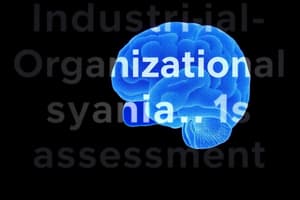Podcast
Questions and Answers
What are the three categories in Fleishman's taxonomy of abilities?
What are the three categories in Fleishman's taxonomy of abilities?
- Cognitive, Perceptual-motor, Physical (correct)
- Cognitive, Emotional, Physical
- Cognitive, Behavioral, Physical
- Cognitive, Social, Physical
The Five Factor Model emphasizes the role of education in predicting job performance.
The Five Factor Model emphasizes the role of education in predicting job performance.
False (B)
What is the primary focus of screen-out tests?
What is the primary focus of screen-out tests?
To identify signs of psychopathology.
A combination of skills, knowledge, abilities, and personality characteristics is known as a __________.
A combination of skills, knowledge, abilities, and personality characteristics is known as a __________.
Match the following terms with their definitions:
Match the following terms with their definitions:
Which of the following traits would an employee with high integrity most likely exhibit according to the Five Factor Model?
Which of the following traits would an employee with high integrity most likely exhibit according to the Five Factor Model?
Faking on a personality test is always intentional and deceptive.
Faking on a personality test is always intentional and deceptive.
Name one of the measures of 'g'.
Name one of the measures of 'g'.
As job complexity increases, the predictive value of general intelligence tests __________.
As job complexity increases, the predictive value of general intelligence tests __________.
What is a potential drawback of speed tests?
What is a potential drawback of speed tests?
Flashcards
Individual differences model
Individual differences model
Assumes different jobs require diverse attributes, remain stable over time and can be measured.
Fleishman’s taxonomy
Fleishman’s taxonomy
Classifies 52 abilities into cognitive, perceptual-motor, and physical abilities.
'g' in intelligence testing
'g' in intelligence testing
Refers to general intelligence, assessing knowledge acquisition, reasoning, and problem-solving ability.
Five Factor Model
Five Factor Model
Signup and view all the flashcards
Integrity in personality traits
Integrity in personality traits
Signup and view all the flashcards
Faking in personality tests
Faking in personality tests
Signup and view all the flashcards
Competencies
Competencies
Signup and view all the flashcards
Test battery
Test battery
Signup and view all the flashcards
Psychomotor ability tests
Psychomotor ability tests
Signup and view all the flashcards
Situational interview
Situational interview
Signup and view all the flashcards
Study Notes
Fundamental Assumptions of the Individual Differences Model
- I-O psychologists assume different jobs require different attributes.
- Adults possess various attributes that remain relatively stable over time.
- Attributes are measurable accurately.
Fleishman's Taxonomy of Abilities
- Fleishman's taxonomy groups 52 abilities into three categories: cognitive, perceptual-motor, and physical abilities.
Measures of "g"
- "g" measures assess knowledge acquisition, reasoning ability, and problem-solving ability.
- Predictive value of "g" tests increases with job complexity.
The Five Factor Model (FFM)
- The FFM describes typical responses to people and events.
- It highlights personality's importance in job performance.
- It's based on statistical and conceptual analysis.
Integrity and the FFM
- High integrity is often associated with high scores in Emotional Stability, Agreeableness, and Conscientiousness.
Faking on Personality Tests
- Faking may not be deliberate since personality involves self-presentation.
- Self-efficacy and faking are sometimes conflated.
- Candidates often try to portray the ideal applicant image.
Skills and Competencies
- Skills are practiced actions.
- Competencies are combinations of skills, knowledge, abilities, and personality traits.
- Competencies enable successful job performance.
Test Batteries and Types of Tests
- Test batteries consist of multiple tests, not a single one.
- Speed tests have strict time limits, often causing many test takers to fail to complete the test.
- Speed tests' focus on time may not be fair.
- Psychomotor ability tests involve tasks requiring dexterity and coordinated limb movement, ranging from simple actions to complex actions.
- Screen-out tests identify psychopathology, while screen-in tests identify variations of normal personality.
Criticisms of Individual Assessments
- Some individual assessments aren't as rigorously validated as other methods.
- Some summaries may be skewed by only a few aspects of the evaluation process.
- Many individual assessments infringe on candidate privacy.
Interview Types and Methods
- Situational interviews require candidates to describe how they'd address hypothetical workplace situations (e.g., handling a dissatisfied client).
- Work sample tests use assessments that closely simulate real workplace conditions.
Incremental Validity
- Incremental validity describes when a new assessment adds value beyond existing methods, like an interview improving prediction beyond a cognitive ability test.
Graphology
- Graphology assesses personality traits based on handwriting characteristics.
Drug Tests
- Drug tests primarily predict absenteeism or involuntary termination.
Studying That Suits You
Use AI to generate personalized quizzes and flashcards to suit your learning preferences.



